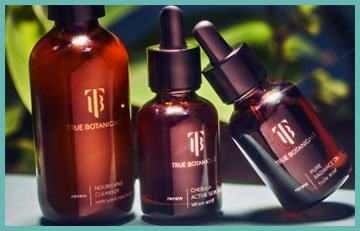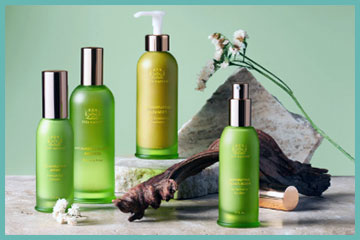I’m on a mission to find skincare that delivers results without compromising on safety or sustainability.
True Botanicals and Tata Harper, two heavyweights in clean beauty, promise just that.
In this article, I’ll compare their products, philosophies, and performance through my own experience, weighing pros and cons to help you decide which brand suits your skin.
With a conversational tone and an analytical lens, I’ll break down key features and share insights to guide your choice.
Comparison Table: True Botanicals Vs. Tata Harper
| Feature | True Botanicals | Tata Harper |
| Founded | 2015 | 2010 |
| Certifications | MADE SAFE, Vegan, Cruelty-Free, EWG | Non-GMO, Cruelty-Free, ECOCERT |
| Key Ingredients | Chebula, Algae, Kombucha, Plant Oils | Farm-Grown Botanicals, Essential Oils |
| Price Range | $38–$215 | $48–$340 |
| Best For | Anti-Aging, Hydration, Sensitive Skin | Brightening, Exfoliation, Reactive Skin |
| Packaging | Glass, Recyclable | Glass, Recyclable |
| Scent Profile | Mild, Natural | Floral, Herbal |
| Clinical Testing | Dermatologist-Tested, Hypoallergenic | Consumer Studies, Non-Clinical |
| Availability | Online, Select Retail | Sephora, Nordstrom, Online |
My Journey Into Clean Beauty
A few years ago, I stood in front of my bathroom mirror, frustrated. My skin was dull, prone to breakouts, and reacting to every product I tried.
Conventional skincare wasn’t cutting it, and I was wary of the long ingredient lists filled with chemicals I couldn’t pronounce. That’s when I turned to clean beauty, drawn by its promise of natural, effective formulas.
True Botanicals and Tata Harper kept popping up in my research, praised for their commitment to non-toxic ingredients and luxurious results. I decided to put both to the test, using their products for months to see which brand truly transformed my skin.
True Botanicals: The Science-Meets-Nature Approach

True Botanicals caught my attention with its sleek glass bottles and bold claims of clinical efficacy. Founded in 2015 by Hillary Peterson, the brand emphasizes bio-compatible ingredients that work in harmony with your skin. Their MADE SAFE certification, which bans over 15,000 toxic substances, gave me confidence I wasn’t slathering harmful chemicals on my face.
Key Features of True Botanicals
The standout ingredient in many True Botanicals products is chebula, an Ayurvedic fruit packed with antioxidants. Their Renew Chebula Active Serum ($90) became a staple in my routine. After a month, my fine lines looked softer, and my skin had a hydrated glow. The serum’s lightweight texture and subtle scent were perfect for my sensitive skin, which often rebels against heavily fragranced products.
Another favorite was the Ginger Turmeric Cleansing Balm ($48). It melts makeup and grime without stripping my skin, leaving it plump and soft. The balm’s rich texture feels indulgent, but I noticed occasional grittiness, which was a minor annoyance. Their At Home Facialist Peel ($88) impressed me with its 27.2% blend of AHA, BHA, PHA, and THX. It tingled slightly but revealed brighter, smoother skin after just 15 minutes.
True Botanicals also prioritizes sustainability. Their recyclable glass packaging and carbon-neutral shipping align with my eco-conscious values. Every product is dermatologist-tested and hypoallergenic, which reassured me as someone with reactive skin.
Pros of True Botanicals
- Clinically proven results: Instrumental and consumer studies back their claims, like reduced fine lines and improved hydration.
- Gentle formulations: Ideal for sensitive skin, with mild scents and no essential oils in some products.
- Sustainable packaging: Glass bottles and eco-friendly practices reduce environmental impact.
- Broad range: Over 30 SKUs, from cleansers to serums, cater to various skin concerns.
- MADE SAFE certification: Rigorous safety standards eliminate toxic ingredients.
Cons of True Botanicals
- Pricey: Products like the Pure Radiance Oil ($110) can strain budgets.
- Texture inconsistencies: The cleansing balm sometimes felt gritty, which disrupted the luxury experience.
- Limited retail availability: Mostly online, which may inconvenience in-store shoppers.
- Subtle results: Some products, like the Nutrient Mist ($38), took weeks to show noticeable effects.
Tata Harper: The Farm-to-Face Philosophy

Tata Harper’s green glass bottles and floral scents screamed luxury when I first unboxed them. Founded in 2010 by Tata Harper herself, the brand is rooted in her Vermont farm, where many ingredients are grown. The farm-to-face ethos and ECOCERT certification, ensuring non-GMO and natural ingredients, made me feel like I was treating my skin to a spa day.
Key Features of Tata Harper
The Clarifying Cleanser ($88) was a game-changer for my combination skin. Its gel texture, infused with mint and herbs, left my face refreshed and tingly. It tackled my oily T-zone without drying out my cheeks, though its strong scent might overwhelm sensitive noses. The Resurfacing Mask ($68) lived up to its hype, exfoliating with natural AHAs and leaving my skin radiant after 20 minutes.
For hydration, the Fortifying Moisturizer ($120) from the Superkind line was a standout. Designed for reactive skin, it’s free from essential oils and has a lightweight, satin finish. My skin felt nourished without greasiness, perfect for summer days. Tata Harper’s products often feature farm-grown botanicals like calendula and chamomile, which soothe irritation and add a natural glow.
Their packaging, like True Botanicals, is recyclable glass, and each bottle has a batch number etched into it, emphasizing freshness. While Tata Harper doesn’t conduct clinical trials like True Botanicals, their consumer studies and loyal following speak to their efficacy.
Pros of Tata Harper
- Luxurious experience: Floral scents and rich textures feel like a spa treatment.
- Farm-fresh ingredients: Botanicals grown on their Vermont farm ensure quality and potency.
- Superkind line: Tailored for sensitive skin, free from common irritants like essential oils.
- Wide availability: Found at Sephora, Nordstrom, and other retailers, making it easy to try.
- Effective exfoliation: Products like the Resurfacing Mask deliver instant brightness.
Cons of Tata Harper
- High cost: The Elixir Vitae ($340) is a splurge that’s hard to justify.
- Strong scents: Essential oils in many products can irritate sensitive skin.
- No clinical testing: Relies on consumer feedback rather than scientific studies.
- Limited range for oily skin: Fewer options for acne-prone or oily skin types compared to True Botanicals.
Read More: My Thoughts On Sulwhasoo vs. Shiseido
Head-to-Head: How They Stack Up
Using both brands side by side gave me a clear sense of their strengths and weaknesses. Here’s how they compare across key areas:
Ingredients and Formulations
True Botanicals leans on science-backed ingredients like chebula and kombucha, which target anti-aging and hydration. Their formulas are gentle, with mild scents that suit sensitive skin. Tata Harper, on the other hand, uses farm-grown botanicals and essential oils, which deliver a sensory experience but can be too potent for some. The Superkind line addresses this, but it’s a smaller subset of their range.
I found True Botanicals’ Renew Chebula Active Serum more effective for fine lines than Tata Harper’s Rejuvenating Serum ($168), which felt heavier and took longer to absorb. However, Tata’s Clarifying Cleanser outperformed True Botanicals’ cleansing balm for controlling oiliness.
Efficacy and Results
True Botanicals’ clinical studies gave me confidence in their claims. After two months, my skin looked brighter and more even-toned with their serum and peel. Tata Harper’s products, while not clinically tested, delivered immediate results with their mask and cleanser. My skin felt polished and radiant, but the effects faded faster than with True Botanicals’ longer-term benefits.
For sensitive skin, True Botanicals felt safer, with fewer reactions. Tata Harper’s Superkind moisturizer was a close contender, but their scented products occasionally caused redness.
Price and Value
Both brands are premium, but Tata Harper’s prices climb higher, with products like the Elixir Vitae at $340. True Botanicals’ top-tier item, the Pure Radiance Oil, is $110, making it slightly more accessible. I felt True Botanicals offered better value for consistent results, while Tata Harper’s luxury appeal justified its cost for special-occasion products like masks.
Packaging and Sustainability
Both use recyclable glass, but True Botanicals edges out with carbon-neutral shipping and broader certifications like MADE SAFE and EWG. Tata Harper’s farm-based production is eco-friendly, but their lack of carbon-neutral claims slightly dims their sustainability shine.
Accessibility
Tata Harper wins for availability, with products at Sephora and Nordstrom. True Botanicals is mostly online, though their customer service is stellar, answering my questions promptly. If you prefer trying before buying, Tata Harper’s retail presence is a plus.
My Personal Verdict
After months of testing, I lean toward True Botanicals for my sensitive, aging skin. Their gentle formulas, clinical backing, and sustainable practices align with my priorities. The Renew Chebula Active Serum and At Home Facialist Peel became non-negotiables in my routine, delivering consistent glow and smoothness. That said, Tata Harper’s Clarifying Cleanser and Resurfacing Mask are unbeatable for quick radiance, and I keep them in rotation for special days.
Your choice depends on your skin type and preferences. If you have sensitive skin and value science-backed results, True Botanicals is likely your match. If you crave a luxurious, spa-like experience and don’t mind stronger scents, Tata Harper could be your go-to. Both brands elevate clean beauty, but they cater to slightly different needs.
Tips for Choosing Between True Botanicals and Tata Harper
To make your decision easier, consider these practical tips:
- Assess your skin type: Sensitive or reactive skin may prefer True Botanicals’ milder formulas or Tata Harper’s Superkind line.
- Test samples: Tata Harper’s retail availability makes it easier to try products in-store. True Botanicals offers travel sizes online.
- Budget wisely: Start with one or two hero products, like True Botanicals’ serum or Tata Harper’s mask, to test value.
- Check ingredients: If essential oils irritate your skin, stick to True Botanicals or Tata Harper’s Superkind range.
- Prioritize goals: Anti-aging? Go True Botanicals. Brightening? Tata Harper’s exfoliants shine.
My Skincare Routine with Both Brands
To give you a real-world sense, here’s how I blended both brands into my routine:
- Morning: Tata Harper Clarifying Cleanser, True Botanicals Renew Chebula Active Serum, True Botanicals Pure Radiance Oil, SPF.
- Evening: True Botanicals Ginger Turmeric Cleansing Balm, Tata Harper Resurfacing Mask (weekly), True Botanicals Phyto-Retinol Sleep Serum, Tata Harper Fortifying Moisturizer.
This hybrid approach balanced instant glow with long-term benefits, but I noticed True Botanicals’ products anchored my routine’s consistency.
The Broader Impact of Clean Beauty
Using True Botanicals and Tata Harper opened my eyes to clean beauty’s potential. Beyond personal results, both brands champion sustainability and transparency, pushing the industry toward safer, eco-conscious practices. True Botanicals’ MADE SAFE certification and Tata Harper’s farm-based production inspire confidence that I’m supporting companies that care about my skin and the planet.
Read More: My Thoughts On Yehwadam Vs. Sulwhasoo
Frequently Asked Questions (FAQ)
Yes, True Botanicals is excellent for sensitive skin, with clinically proven, clean formulas that deliver results.
There’s no confirmed evidence that Jessica Chastain uses True Botanicals, despite some brand mentions.
Absolutely, Tata Harper is a luxury green beauty brand known for premium ingredients and high-end pricing.
Laura Dern has endorsed True Botanicals, praising their clean, effective products in interviews.
Final Thoughts: Your Skin, Your Choice
You deserve skincare that makes you feel confident and cared for. True Botanicals and Tata Harper both deliver, but their approaches differ. I found True Botanicals’ science-driven, gentle formulas best suited my sensitive skin, while Tata Harper’s luxurious, farm-fresh products added a touch of indulgence. Try their hero products, listen to your skin, and let your priorities guide you. What’s your next skincare step? I’d love to hear your thoughts!
